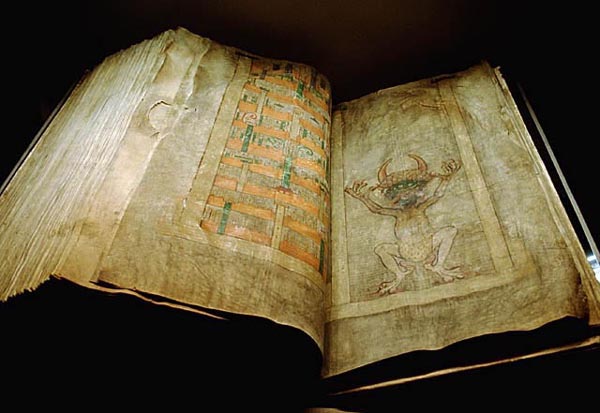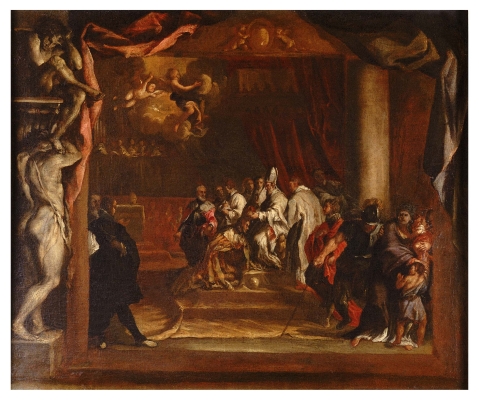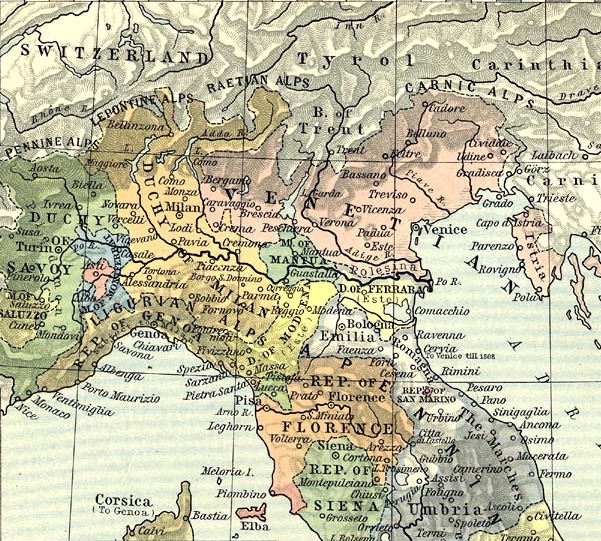|
Romzug
An ''Italienzug'' (also known as ''Romfahrt'' or ''Romzug'', Latin ''expeditio italica'') was the expedition undertaken by an elected king of the Romans to be crowned Holy Roman emperor in City of Rome. Prior to the reforms of Frederick Barbarossa, the kings of the Romans struggled to muster an army for the expedition, for they needed the formal approval of the '' Reichstag''. If such permission was granted, the king had permission to recruit knights for their military service in Italy for 410 days. However, the nobility was generally disinterested and inclined to rather substitute a monetary payment for the service. Therefore, the small force tended to be composed out of mercenaries and high ranking clergymen, reinforced by loyal Italian cities. Occasionally the substitution wasn't enough and kings like Henry V ended up using their dowry to fund their ''Italienzug''. Following Barbarossa's struggles against the Lombard League towards the end of the 12th century, the system was r ... [...More Info...] [...Related Items...] OR: [Wikipedia] [Google] [Baidu] |
Coronation Of The Holy Roman Emperor
The Coronation of the Holy Roman Emperor was a ceremony in which the ruler of Western Europe's then-largest political entity received the Imperial Regalia from the hands of the Pope, symbolizing both the pope's right to crown Christian sovereigns and also the emperor's role as protector of the Roman Catholic Church. The Holy Roman Empresses were crowned as well. The Holy Roman Empire was established in the year 800 under Charlemagne. Later emperors were crowned by the pope or other Catholic bishops. Charles V became the last Holy Roman Emperor to be crowned by a pope: Clement VII in Bologna in 1530. Thereafter, until the abolition of the empire in 1806, no further crownings by the Pope were held.See also Guy Stair SaintyThe Holy Roman Empire: Introduction. From thAlmanach de la Courwebsite. Retrieved on 14 September 2008. Later rulers simply proclaimed themselves ''Imperator Electus Romanorum'' or "Elected Emperor of the Romans" after their election by the princes and coronation as ... [...More Info...] [...Related Items...] OR: [Wikipedia] [Google] [Baidu] |
Codex Balduini Trevirensis - Alpenüberquerung Heinrich VII
The codex (plural codices ) was the historical ancestor of the modern book. Instead of being composed of sheets of paper, it used sheets of vellum, papyrus, or other materials. The term ''codex'' is often used for ancient manuscript books, with handwritten contents. A codex, much like the modern book, is bound by stacking the pages and securing one set of edges by a variety of methods over the centuries, yet in a form analogous to modern bookbinding. Modern books are divided into paperback or softback and those bound with stiff boards, called hardbacks. Elaborate historical bindings are called treasure bindings. At least in the Western world, the main alternative to the paged codex format for a long document was the continuous scroll, which was the dominant form of document in the ancient world. Some codices are continuously folded like a concertina, in particular the Maya codices and Aztec codices, which are actually long sheets of paper or animal skin folded into pages. Th ... [...More Info...] [...Related Items...] OR: [Wikipedia] [Google] [Baidu] |
Princes Of The Holy Roman Empire
Prince of the Holy Roman Empire ( la, princeps imperii, german: Reichsfürst, cf. ''Fürst'') was a title attributed to a hereditary ruler, nobleman or prelate recognised as such by the Holy Roman Emperor. Definition Originally, possessors of the princely title bore it as immediate vassals of the Emperor who held a fief (secular or ecclesiastical) that had no suzerain except the Emperor. However, by the time the Holy Roman Empire was abolished in 1806, there were a number of holders of Imperial princely titles who did not meet these criteria. Thus, there were two main types of princes: those who exercised '' Landeshoheit'' (sovereignty within one's territory while respecting the laws and traditions of the empire) as well as an individual or shared vote in the College of Princes, and those whose title was honorary (the possessor lacking an immediate Imperial fief and/or a vote in the Imperial Diet). The first came to be reckoned as "royalty" in the sense of being treated as ... [...More Info...] [...Related Items...] OR: [Wikipedia] [Google] [Baidu] |
Coronation Of Charles V
Charles V was crowned Holy Roman Emperor by Pope Clement VII in the San Petronio Basilica in Bologna on 24 February 1530. He was the last Holy Roman Emperor to be crowned by a pope. Context for the coronation Pope Clement VII Medici and Charles V agreed to the imperial coronation as a means to heal the political and religious conflicts that had divided the Italian and European world and to reach a "universal peace" in the Christian West that would ensure a more effective defence against Turkish aggression which had reached the doors of Vienna in 1529. Preparations for the meeting between the two sovereigns encountered difficulties and delays due to the Pope's skepticism of Charles V's proposals. One concern, among others, was the location of this meeting. Pope Clement VII preferred Rome but Charles V chose instead Bologna, given that many Romans blamed Charles for the Sack of Rome (1527), which was carried out by his mutinous troops. This moment of extreme conflict between Pap ... [...More Info...] [...Related Items...] OR: [Wikipedia] [Google] [Baidu] |
War Of The League Of Cambrai
The War of the League of Cambrai, sometimes known as the War of the Holy League and several other names, was fought from February 1508 to December 1516 as part of the Italian Wars of 1494–1559. The main participants of the war, who fought for its entire duration, were France, the Papal States, and the Republic of Venice; they were joined at various times by nearly every significant power in Western Europe, including Spain, the Holy Roman Empire, England, the Duchy of Milan, the Republic of Florence, the Duchy of Ferrara, and the Swiss. The war started with the ''Italienzug'' of Maximilian I, King of the Romans, crossing into Venetian territory in February 1508 with his army on the way to be crowned Holy Roman Emperor by the Pope in Rome. Meanwhile, Pope Julius II, intending to curb Venetian influence in northern Italy, brought together the League of Cambrai — an anti-Venetian alliance consisting of him, Maximilian I, Louis XII of France, and Ferdinand II of Aragon ... [...More Info...] [...Related Items...] OR: [Wikipedia] [Google] [Baidu] |
Maximilian I, Holy Roman Emperor
Maximilian I (22 March 1459 – 12 January 1519) was King of the Romans from 1486 and Holy Roman Emperor from 1508 until his death. He was never crowned by the pope, as the journey to Rome was blocked by the Venetians. He proclaimed himself Elected Emperor in 1508 (Pope Julius II later recognized this) at Trent, thus breaking the long tradition of requiring a Papal coronation for the adoption of the Imperial title. Maximilian was the son of Frederick III, Holy Roman Emperor, and Eleanor of Portugal. Since his coronation as King of the Romans in 1486, he ran a double government, or ''Doppelregierung'' (with a separate court), with his father until Frederick's death in 1493. Maximilian expanded the influence of the House of Habsburg through war and his marriage in 1477 to Mary of Burgundy, the ruler of the Burgundian State, heir of Charles the Bold, though he also lost his family's original lands in today's Switzerland to the Swiss Confederacy. Through marriage of his son Phil ... [...More Info...] [...Related Items...] OR: [Wikipedia] [Google] [Baidu] |
Henry VII, Holy Roman Emperor
Henry VII (German: ''Heinrich''; c. 1273 – 24 August 1313),Kleinhenz, pg. 494 also known as Henry of Luxembourg, was Count of Luxembourg, King of Germany (or '' Rex Romanorum'') from 1308 and Holy Roman Emperor from 1312. He was the first emperor of the House of Luxembourg. During his brief career he reinvigorated the imperial cause in Italy, which was racked with the partisan struggles between the divided Guelf and Ghibelline factions, and inspired the praise of Dino Compagni and Dante Alighieri. He was the first emperor since the death of Frederick II in 1250, ending the Great Interregnum of the Holy Roman Empire; however, his premature death threatened to undo his life's work. His son, John of Bohemia, failed to be elected as his successor, and there was briefly another anti-king, Frederick the Fair, contesting the rule of Louis IV. Life Election as King of the Romans Born around 1273 in Valenciennes, he was a son of Count Henry VI of Luxembourg and Béatrice from the ... [...More Info...] [...Related Items...] OR: [Wikipedia] [Google] [Baidu] |
Roman Month
The Roman Month (German ''Römer Monat'', pl. ''Römer Monate'', abbr. RM) was a basic unit of imperial taxation in the Holy Roman Empire, initially worth around 128,000 Rhenish guilders when the underlying tax was created in 1521 by the emperor Charles V, equivalent to a month's wages for around 4,202 cavalry and 20,063 infantrymen. It gained this title due to its initial purpose of providing for one month's escort for the King of the Romans' trip to Rome to be crowned Holy Roman Emperor by the Pope (the ''Italienzug''), though it was rarely, if ever, used for this purpose. The tax was collected through a system that reflected the divided, corporate nature of the Holy Roman Empire. Though the local territorial powers recognized the need for a common purse to protect and preserve the Empire, they were simultaneously unwilling to surrender power to the Emperor. Thus, instead of a direct tax collected by the Emperor, obligations were set through the Worms ''Reichsmatrikel'' on t ... [...More Info...] [...Related Items...] OR: [Wikipedia] [Google] [Baidu] |
King Of The Romans
King of the Romans ( la, Rex Romanorum; german: König der Römer) was the title used by the king of Germany following his election by the princes from the reign of Henry II (1002–1024) onward. The title originally referred to any German king between his election until his being crowned Emperor by the Pope. The title was also used to designate the successor to the throne elected during the lifetime of a sitting Emperor. From the 16th century onwards, as German kings adopted the title of Emperor-elect and ceased to be crowned by the Pope, the title continued to be used solely for a elected successor to the throne during his predecessor's lifetime. The actual title varied over time. During the Ottonian period, it was King of the Franks (German: ''König der Franken'', Latin: ''Rex Francorum''), from the late Salian period it was King of the Romans (German: ''König der Römer'', Lat.: ''Rex Romanorum''). In the Modern Period, the title King in Germania (German: ''König in G ... [...More Info...] [...Related Items...] OR: [Wikipedia] [Google] [Baidu] |
Henry V, Holy Roman Emperor
Henry V (german: Heinrich V.; probably 11 August 1081 or 1086 – 23 May 1125, in Utrecht) was King of Germany (from 1099 to 1125) and Holy Roman Emperor (from 1111 to 1125), as the fourth and last ruler of the Salian dynasty. He was made co-ruler by his father, Henry IV, Holy Roman Emperor, Henry IV, in 1098. In Emperor Henry IV's conflicts with the Princes of the Holy Roman Empire, imperial princes and the struggle against the reform papacy during the Investiture Controversy, young Henry V allied himself with the opponents of his father. He forced Henry IV to abdicate on 31 December 1105 and ruled for five years in compliance with the imperial princes. He tried, unsuccessfully, to withdraw the regalia from the bishops. Then in order to at least preserve the previous right to invest, he captured Pope Paschal II and forced him to perform his imperial coronation in 1111. Once crowned emperor, Henry departed from joint rule with the princes and resorted to earlier Salian autocrati ... [...More Info...] [...Related Items...] OR: [Wikipedia] [Google] [Baidu] |







